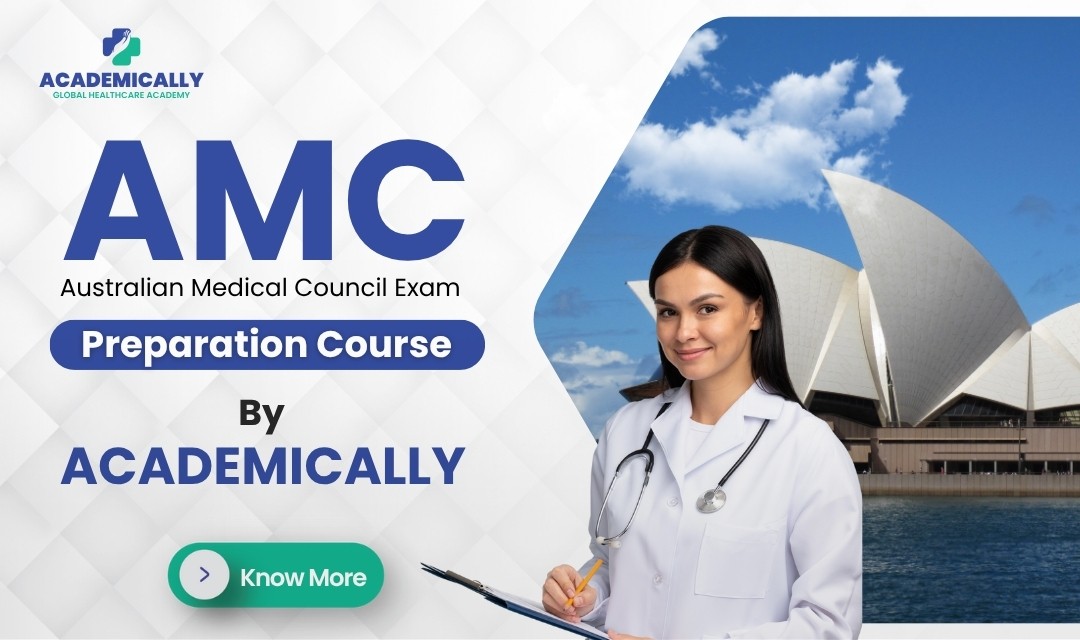The Australian Medical Council (AMC) exams is one of the most popular exams now. This is because of how easy the exams are compared to other countries and the countless benefits you get once you become a doctor in Australia.
But the thing is, like any exam, AMC also needs proper preparation and sometimes without preparation it can be challenging for international medical graduates.
Success doesn’t just come from studying textbooks for AMC. It requires consistently practicing question papers. One of the most effective ways to prepare is solving an AMC QBank or AMC question bank, which allows you to practice exam-style questions repeatedly and track your progress.
About the AMC Exam
The Australian Medical Council (AMC) Exam is for international medical graduates (IMGs) who want to practice medicine in Australia. It makes sure that all doctors meet Australian standards.
The AMC Exam consists of two main parts:
- AMC MCQ Exam (Part 1) – A multiple-choice exam
- AMC Clinical Exam (Part 2) – A practical, hands-on assessment of clinical skills
AMC MCQ Exam (Part 1) Overview
| Category | Details |
| Total Questions | 150 MCQs |
| Duration | 3.5 hours (single session) |
| Format | Computer-based (no paper format available) |
| Question Type | A-type MCQs: each question or incomplete statement is followed by five options (A–E). Choose the single best answer. |
| Scoring | • 120 MCQs contribute to the final score • 30 MCQs are pilot (non-scored) items integrated throughout the exam (except the last 20) • No negative marking |
| Passing Score | Scaled score of ~250 or higher (on AMC scale where 250 is the passing standard) |
AMC MCQ Exam Blueprint
| AMC CAT MCQ Syllabus | Number of Items |
| Adult Health – Medicine | 35 |
| Adult Health – Surgery | 25 |
| Women’s Health – Obstetrics & Gynecology | 15 |
| Child Health | 15 |
| Mental Health | 15 |
| Population Health & Ethics | 15 |
| Total (Scored Questions) | 120 |
To pass the AMC exam on the first attempt, enroll in Academically’s AMC Preparation Course. You will get live and recorded lectures, study materials, practice questions, AI-based mock tests, personalised guidance and much more.

AMC Questions: What to Expect
The AMC MCQ exam doesn’t just test your memory, it evaluates how you apply clinical knowledge in real-world scenarios.
AMC questions are designed to check:
- Clinical reasoning: Can you diagnose and manage a case safely?
- Decision-making: Do you know the best next step in management?
- Application of knowledge: Are you using guidelines, not guesswork?
Each question is an A-type MCQ with five options (A–E). Your goal is to pick the single best answer, not just a correct one, a key difference many IMGs miss at first.
What is an AMC QBank (AMC Question Bank)?
An AMC QBank (or AMC Question Bank) is a digital collection of practice questions designed to closely match the style, difficulty, and topics of the real AMC MCQ exam.
Here’s why an AMC QBank is one of the most powerful tools for exam success:
- Familiarity with Exam Style: Get used to the wording and structure of AMC questions.
- Targeted Revision: Focus on your weak areas by filtering questions by subject.
- Timed Practice: Simulate exam conditions and improve time management.
- Progress Tracking: See how your scores improve over time and stay motivated.
Think of an AMC QBank as your personal training ground, where you can make mistakes, learn, and get better before the real exam day.
Tips for Using AMC QBank Effectively
To get the most benefit from your AMC question bank, follow these strategies:
- Set a Daily Target: Aim for 30–50 questions per day.
- Review Explanations Carefully: Don’t just check the right answer, read why the others are wrong.
- Mix Subjects: Avoid doing only medicine or only surgery in one sitting. The real exam is mixed.
- Track Weak Areas: Revisit topics you score lowest in weekly.
- Simulate Exam Conditions: Take full-length timed blocks to build stamina.
Where to Get an AMC Question Bank (QBank)
There are several online platforms that offer AMC MCQ question banks, but it’s important to choose one that is:
- Up-to-date: Covers the latest AMC MCQ syllabus and blueprint.
- High-quality: Questions should be exam-style, with clear explanations.
- Progress-focused: Offers performance tracking and analytics to identify weak areas.
- User-friendly: Easy navigation and mobile compatibility for study on the go.
Why Choose Academically’s AMC QBank
If you’re looking for a reliable AMC question bank, Academically’s AMC QBank is designed specifically for international medical graduates preparing for the AMC Part 1 exam.
Here’s what makes it stand out:
- Comprehensive Coverage: Includes questions across all AMC blueprint topics- Medicine, Surgery, OBGYN, Pediatrics, Psychiatry, and Population Health.
- Real Exam Simulation: Timed practice tests that closely mimic AMC MCQ exam conditions.
- AI-Based Mock Tests: Smart mocks that adapt to your performance, give you a real-time readiness score, and help you focus on weak areas.
- Detailed Explanations: Each question comes with clear, evidence-based explanations so you learn while practicing.
- Performance Analytics: Track your progress over time, identify weak areas, and focus your revision smartly.
- Flexible Access: Study anytime, anywhere, with mobile-friendly access.
With Academically’s AMC QBank, you’re not just answering questions, you’re building confidence, speed, and exam readiness.
What Students Say About Academically’s AMC QBank
Real success stories inspire confidence. Here’s what some of Academically’s AMC students have to say:
“Academically gave me a complete roadmap, from registration to study plans. Their recorded sessions, PDFs, and previous year questions made preparation easy. With their help, I passed AMC on my first attempt.”
— Dr. Sanjana Varghese, FMG from Kerala
“Academically covered 70-80% of my AMC preparation needs. The live classes, mock exams, and one-on-one guidance were game changers. I passed AMC on my first try and now look forward to getting a job in Australia with their support.”
— Dr. Ragasri, MBBS Graduate from Hyderabad
Sample Questions from Academically’s AMC QBank
Here’s a sneak peek at the kind of questions you’ll practice with in Academically’s AMC Question Bank:
Sample Question 1
Q: A 32-year-old woman presents with fatigue, pallor, and glossitis. Blood tests reveal low hemoglobin, low MCV, and low ferritin. What is the most likely diagnosis?
A. Vitamin B12 Deficiency
B. Folate Deficiency
C. Iron Deficiency Anemia
D. Hemolytic Anemia
E. Thalassemia Minor
Ans: C
Explanation: Low MCV (microcytic anemia) and low ferritin indicate iron deficiency. Vitamin B12 and folate deficiencies usually cause macrocytic anemia.
Sample Question 2
Q: A 70-year-old man presents with sudden onset right-sided weakness and facial droop. CT brain shows an infarct in the MCA territory. What is the best next step in management?
A. Start aspirin immediately
B. Start warfarin immediately
C. Wait 24 hours and then treat
D. Start thrombolysis without CT
E. Give steroids
Ans: A
Explanation: Aspirin should be started immediately in ischemic stroke unless contraindicated. Warfarin is not first-line, and thrombolysis must be preceded by CT.
Sample Question 3
Q: A 5-year-old child presents with a barking cough, inspiratory stridor, and hoarseness. What is the most likely diagnosis?
A. Epiglottitis
B. Croup (Laryngotracheobronchitis)
C. Foreign Body Aspiration
D. Asthma
E. Bronchiolitis
Ans: B
Explanation: Barking cough and stridor are classic signs of croup. Epiglottitis presents with drooling, muffled voice, and high fever.
Sample Question 4
Q: A 45-year-old man with diabetes presents with a non-healing ulcer on the plantar surface of his foot. There is no surrounding erythema. What is the most appropriate next step?
A. Assess for neuropathy and vascular status
B. Start empirical antibiotics immediately
C. Apply topical antiseptics only
D. Immediate amputation
E. Discharge with routine follow-up
Ans: A
Explanation: In diabetic foot ulcers, evaluation of neuropathy and vascular supply is the first step. Not all ulcers require antibiotics or surgical intervention immediately.
Sample Question 5
A 28-year-old woman presents with irregular periods, hirsutism, and acne. Blood tests show elevated LH and testosterone levels. What is the most likely diagnosis?
A. Polycystic Ovary Syndrome (PCOS)
B. Hypothyroidism
C. Hyperprolactinemia
D. Cushing’s Syndrome
E. Primary ovarian failure
Ans: A
Explanation: PCOS is characterized by hyperandrogenism, irregular periods, and elevated LH/testosterone. Other endocrine disorders present differently.
These are just examples. Academically’s QBank contains hundreds of high-yield, exam-focused questions with detailed explanations to help you prepare effectively.
4-Month AMC MCQ Study Plan
| Phase | Duration | Focus | QBank Practice & Mock Tests |
| Phase 1 | Weeks 1–6 | Cover all AMC blueprint topics systematically using Academically’s recorded/live classes and study notes | 20–30 questions/day (untimed, subject-wise) to build concept clarity |
| Phase 2 | Weeks 7–10 | Revise completed topics, strengthen weak areas, start mixing subjects | 40–60 questions/day (timed blocks) + detailed review of explanations |
| Phase 3: | Weeks 11–14 | Simulate real exam conditions and build stamina | 80–100 questions/day (mixed topics), 1 AI-based mock test weekly, dynamically adapts question difficulty based on your performance |
| Phase 4 | Weeks 15–16 | Focused revision of weak areas + exam readiness | AI-based mock every 3–4 days + repeat incorrect questions using QBank filters |
Must Check: AcadPrep - AMC Exam Mock Series
Final Words
The AMC MCQ exam is the first step to practicing medicine in Australia and with the right preparation strategy, it’s absolutely achievable.
Instead of relying only on textbooks, focus on consistent QBank practice and review your mistakes until you’re confident.
If you are ready to get started, join Academically’s AMC Exam Preparation Course and get the QBank today. Give yourself the best chance of clearing AMC Part 1 on your very first attempt.
For any more information or questions you can contact the AMC experts at Academically. They will help you from the start till the end.





